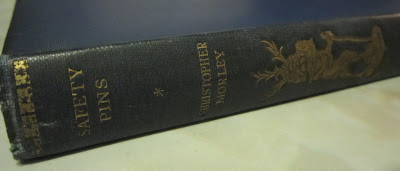I have set myself the 2012 challenge of reading a book published in every year of the twentieth century... here are the links to all the books I've read and reviewed so far!
1900 - Three Men on the Bummel by Jerome K. Jerome
1901 - The Spinster Book by Myrtle Reed
1902 - The Westminster Alice by Saki
1903 - Man and Superman by George Bernard Shaw
1904 - Canon in Residence by V.L. Whitechurch
1905 - Lovers in London by A.A. Milne
1906 - The Railway Children by E. Nesbit
1907 - The Enchanted Castle by E. Nesbit
1908 - The World I Live In by Helen Keller
1909 - The Tale of the Flopsy Bunnies by Beatrix Potter
1910 - Reginald in Russia by Saki
1911 - In A German Pension by Katherine Mansfield
1912 - Daddy Long-legs by Jean Webster
1913 - When William Came by Saki
1914 - What It Means To Marry by Mary Scharlieb
1915 - Metamorphosis by Franz Kafka
1916 - Love At Second Sight by Ada Leverson
1917 - Zella Sees Herself by E.M. Delafield
1918 - Married Love by Marie Stopes
1919 - Not That It Matters by A.A. Milne
1920 - The Mysterious Affair at Styles by Agatha Christie
1921 - The Witch-Cult in Western Europe by Margaret Murray
1922 - Spinster of this Parish by W.B. Maxwell
1923 - Uncanny Stories by May Sinclair
1924 - The Rector's Daughter by F.M. Mayor
1925 - Gentlemen Prefer Blondes by Anita Loos
1926 - Blindness by Henry Green
1927 - Dusty Answer by Rosamond Lehmann
1928 - Time Importuned by Sylvia Townsend Warner
1929 - A Room of One's Own by Virginia Woolf
1930 - His Monkey Wife by John Collier
1931 - Opus 7 by Sylvia Townsend Warner
1932 - Green Thoughts by John Collier
1933 - More Women Then Men by Ivy Compton-Burnett
1934 - Right Ho, Jeeves by P.G. Wodehouse
1935 - The House in Paris by Elizabeth Bowen
1936 - Summer Will Show by Sylvia Townsend Warner
1937 - The Outward Room by Millen Brand
1938 - Dear Octopus by Dodie Smith
1939 - Three Marriages by E.M. Delafield
1940 - One, Two, Buckle My Shoe by Agatha Christie
1941 - Country Moods and Tenses by Edith Olivier
1942 - The Outsider by Albert Camus
1943 - Talking of Jane Austen by Sheila Kaye-Smith and G.B. Stern
1944 - Elders and Betters by Ivy Compton-Burnett
1945 - At Mrs. Lippincote's by Elizabeth Taylor
1946 - Mr. Allenby Loses The Way by Frank Baker
1947 - One Fine Day by Mollie Panter-Downes
1948 - The Corner That Held Them by Sylvia Townsend Warner
1949 - Ashcombe: The Story of a Fifteen-Year Lease by Cecil Beaton
1950 - Jane Austen by Margaret Kennedy
1951 - I. Compton-Burnett by Pamela Hansford Johnson
1952 - Miss Hargreaves: the play by Frank Baker
1953 - Guard Your Daughters by Diana Tutton
1954 - M for Mother by Marjorie Riddell
1955 - The Winds of Heaven by Monica Dickens
1956 - All The Books of My Life by Sheila Kaye-Smith
1957 - Raising Demons by Shirley Jackson
1958 - Mrs. Harris Goes To Paris by Paul Gallico
1959 - Miss Plum and Miss Penny by Dorothy Evelyn Smith
1960 - The Ballad of Peckham Rye by Muriel Spark
1961 - A Grief Observed by C.S. Lewis
1962 - Coronation by Paul Gallico
1963 - A Favourite of the Gods by Sybille Bedford
1964 - The Garrick Year by Margaret Drabble
1965 - Moominpappa at Sea by Tove Jansson
1966 - In Cold Blood by Truman Capote
1967 - The Joke by Milan Kundera
1968 - A Cab at the Door by V.S. Pritchett
1969 - Sunlight on Cold Water by Francoise Sagan
1970 - Frederick the Great by Nancy Mitford
1971 - Ivy & Stevie by Kay Dick
1972 - Ivy Compton-Burnett: a memoir by Cecily Greig
1973 - V. Sackville-West by Michael Stevens
1974 - Look Back With Love by Dodie Smith
1975 - Sweet William by Beryl Bainbridge
1976 - The Takeover by Muriel Spark
1977 - Injury Time by Beryl Bainbridge
1978 - Art in Nature by Tove Jansson
1979 - On The Other Side by Mathilde Wolff-Mönckeberg
1980 - The Shooting Party by Isabel Colegate
1981 - Gossip From Thrush Green by Miss Read
1982 - At Freddie's by Penelope Fitzgerald
1983 - Blue Remembered Hills by Rosemary Sutcliff
1984 - The Only Problem by Muriel Spark
1985 - For Sylvia: An Honest Account by Valentine Ackland
1986 - On Acting by Laurence Olivier
1987 - The Other Garden by Francis Wyndham
1988 - Nervous Conditions by Tsitsi Dangarembga
1989 - Maestro by Peter Goldsworthy
1990 - The Eye of the World by Robert Jordan
1991 - Wise Children by Angela Carter
1992 - Curriculum Vitae by Muriel Spark
1993 - Something Happened Yesterday by Beryl Bainbridge
1994 - Deadline Poet by Calvin Trillin
1995 - The Simmons Papers by Philipp Blom
1996 - Reality and Dreams by Muriel Spark
1997 - The Island of the Colourblind by Oliver Sacks
1998 - The Poisonwood Bible by Barbara Kingsolver
1999 - La Grande Thérèse by Hilary Spurling
























